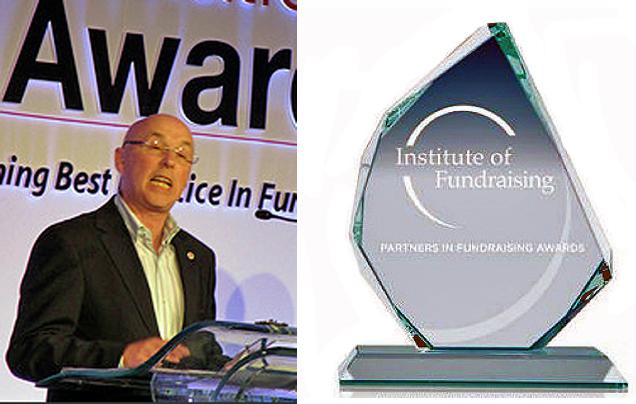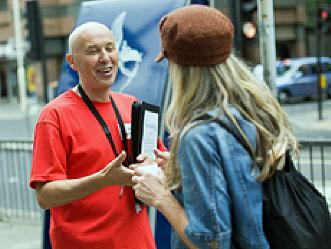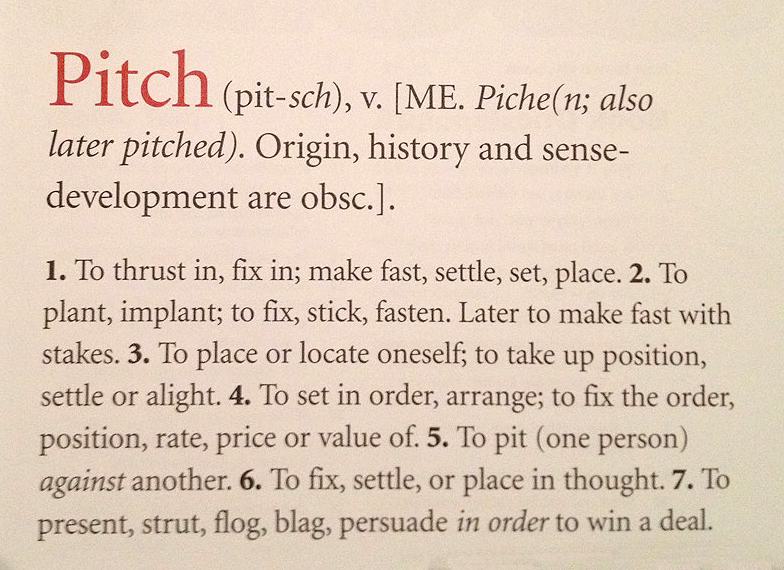Working with suppliers: building partnerships based on value for money
Recently the major UK nonprofit the British Red Cross did something remarkable. They sent two fundraisers and their manager from their face-to-face fundraising agency – an independent commercial supplier company – to visit first hand BRC’s work with poor and marginalised people in Bangladesh.
- Written by
- Mark Astarita
- Added
- May 14, 2013
BRC’s director of fundraising, Mark Astarita, explained why this unusual investment would prove worthwhile, for the charity.
‘Clearly this surprises you Ken, but really it shouldn’t be that unusual. It’s not the first time we’ve done it. Our greatest selling point is the work we do. And seeing it for themselves changed these guys’ lives forever. They wanted to meet with and talk to the poorest of the poor, they went on 14-hour car journeys to do it, they saw things the likes of which most people never get to see: the reality of our work. They’ll probably never get another chance to see these things. Now they truly appreciate why what they do for us really matters. And when they came home, they communicated that to their colleagues and the public too.
‘Through initiatives like this we get 100 per cent from our agencies. They’ll encourage their colleagues on a cold day to knock on doors enthusiastically. If another disaster happens on the far side of world on the day after Christmas (as did the 2004 tsunami) our agencies will be out of their beds planning and preparing our fundraising campaign before most others are even awake.’
Unusually far-sighted though such an initiative might be, this kind of thinking isn’t a particularly radical departure as far as BRC is concerned. Mark is on record as having an enlightened view of suppliers to the sector. In his role as chairman of the UK’s Institute of Fundraising, he was called upon early in 2013 to make a speech at the newly-inaugurated ‘Partners in Fundraising’ awards (the PIFAs). Apart from the visionary nature of the event itself (kudos to IoF), four points from what Mark said that night really stood out.

- ‘Reflecting on the importance of partners and agencies in my day-to-day life, I wouldn’t be here today if it were not for the amazing companies I’ve worked with over the years, that have transformed the fundraising landscape …
- ‘It was not charities that made face-to-face and door-to-door what it is today, it was the likes of the wonderful guys at Appco and Fundraising Initiatives. (So we must ensure that) this vibrant social economy we all work in is not bereft of the entrepreneurial spirit of enterprise we need so badly to drive innovation, efficiency and scale.
- ‘Today the Red Cross raises more than ever before because of the wonderful companies we work with. Without them we would not be growing as we have done throughout the recession.
- ‘Professional fundraising in the UK is second to none in the world today in great part due to some of the amazing people and companies in this room.’
Coming from the UK’s premier fundraising leader working with several supplier companies these views on this generally unsung sector of the fundraising profession just might signify a transformational change in the way senior ‘clients’ in UK charities are coming to view their service companies. Not as mere suppliers but as valued partners and potential innovators, even leaders. Hopefully senior fundraisers will see it as their duty to transmit this perception to their junior colleagues too.
But does an enlightened attitude from one fundraising leader really signify a new approach to the normal agency/client paradigm? Are suppliers genuinely coming in from the cold, to be treated by the charities they serve (and hopefully profit from too) not as grubby commercial necessities but as true partners valued for their specific, unique contribution?
If they are it would be a radical, welcome and commercially wise move.
‘Throughout my career,’ says Mark, ‘as I’ve moved from small through medium to big charities, I’ve always used suppliers and not just the high profile agencies but the less glamorous behind-the-scenes guys like Rapidata too, doing all the data processing and so on. They fill the gaps and help us avoid employing hundreds of people ourselves. They also come up with the ideas that take us forward. And they do it on scale.’
The PIFA awards were set up to recognise this. As suppliers often feel undervalued, even abused, it’s a welcome innovation.
‘Don’t get me wrong,’ Mark is quick to assert. ‘At BRC we drive a very hard bargain. But we try to be fair and realistic. We recognise that it has to be a win/win durable partnership.
‘Sure, agencies make profits, which is good for them and us. We spend a lot of money with a range of suppliers but as a result we make a very much bigger fortune for our cause. But in the charity sector generally suppliers work to tighter than usual margins and they often lose money too and really, if you look at the numbers, it’s the charities they work for who are by a huge margin the biggest winners from the relationship. And so it should be.
Agencies frequently complain that charities treat suppliers shoddily and a worrying trend is that many feel this is getting worse, not better. Absence of respect, squeezing of profitability, splitting and spreading once significant accounts till they become marginal, harder to make viable, and so on.
‘I’d like to think our suppliers view us differently; more positively,’ says Mark.
‘We are a blue chip, substantial client. As we’re in it for the long term and our priority is value for money it’s simply not in our interest to squeeze suppliers or treat them badly. We don’t want to dilute our purchasing power by spreading it too thin. Our objective is to maximise net income over time.That’s an important fundamental difference to being just the most cost-conscious in any one deal. We seek investment over time that will yield a far greater net contribution than one-off, short-term gains. We really are in this for the long term.
‘So we invest in innovation and speculate to accumulate just like any smart enterprise would do. Except we do this with our cause as the winner
‘Charities are inherently conservative because they are bound to preserve public trust and confidence and they are undercapitalised so have limited capacity for taking risks. Yet many charities have substantial reserves and no borrowings. Many don’t maximise their investment potential.
‘So innovation with its attendant risks often has to come from outside the sector. We should encourage that. Within any good fundraising strategy (and budget) there should be space for innovation and exploration. For us, this is all about testing. We improve gradually through a process of continual, rigorous testing.
‘Of course suppliers sometimes try to sell charities things they don’t want. Even though they need it, they may think they don’t. We all struggle with seeing things from the other’s point of view. So we value long-standing relationships that grow in understanding and trust. We’re famous for driving the hardest bargain in town but we also invest a lot of money. We’re good to do business with. And we pay our bills, which is more than can be said for many in the commercial space.’
What agencies don’t like, Mark believes, is not being treated as a partner and kept at arms length, an outsider. Then it becomes very difficult to do a good job, so it’s inefficient and expensive for the client too.
There is the tyranny of purchasing power. It is, inevitably, an unequal relationship. The skill of the client is in minimising that, being demanding but inclusive, staying open to ideas but firmly in the driving seat. As the client reaps the benefits, it’s only fair the charity should fund innovation.
‘At times in some areas there’s been more demand than supply, and that doesn’t work either. What work best are balance, mutual respect and interdependency. It’s not a one-way street,’ says Mark.
‘Clients often lack clarity and change jobs too quickly. Too often they don’t get training or the benefit of wisdom from an older person who’s been there before. But all this applies equally to agencies. ‘
Curiously, there are never any training seminars at sector conferences in how to be an effective client; nor in how to be an effective supplier.
‘There should be’, says Mark. It’s an area we’ve neglected too long.’
‘I’ve never worked with someone I don’t like. I’ve got to respect, admire and like someone to do business with him, or her. I treat suppliers as colleagues, not at arm’s length. It’s in my interest for them to thrive.
‘I’ve no problem with suppliers making a profit. We make vastly more than they do.
‘Some of the invoices I have to sign scare the hell out of me. So I have to be involved, to know what’s going on so I understand what we’re paying for and that we are getting good value for money. If your only focus is on squeezing more out of the price you might not be focusing enough on what really matters – increasing net value.’
‘It’s a competitive world out there. There will be winners and losers. Of course bad behaviour is inexcusable on either side. If people don’t get their act together, they will lose. Those able to secure the best relationships, the best partnerships, engage the best agencies, are going to win and the others are going to be left behind.
‘Fantastic clients get fantastic results. And some people just can’t be helped. Fundraisers should aspire to be fantastic clients just as agencies should aspire to be fantastic suppliers.
‘The Red Cross does industrial scale fundraising – four million conversations, 10 million door drops … We need to recognise unique contribution. The data-prep people who go the extra mile to get an urgent mailing out; the fundraiser who inspires a donor to write expressing appreciation and support; the team leader who comes up with an idea that makes face-to-face fundraising more efficient. And backroom staff, the neglected heroes without whom fundraising on this scale would be impossible.
‘Agencies generally bring skills and experience to our challenges that we couldn’t do ourselves and take the risks that we would otherwise have to carry. So our sector has to find ways to recognise them too.’
Amen to that.
When Mark Astarita took his courage in his hands and stood up at the PIFA awards to tell suppliers to the UK’s fundraising sector just how important and appreciated their contribution is to all the good we collectively achieve, perhaps he was voicing a set of sentiments that will now reverberate around the world and gain the recognition and celebration they truly deserve.
SOFII sincerely hopes so.
What do you think?
Rubbish fundraisers practice as they preach

Face-to-face fundraising legend still celebrates the time that the BRC chief executive, Sir Nicholas Young, and director of fundraising, Mark Astarita, actually went out onto the streets to do it themselves, to sign up donors face to face.
‘We haven’t done it for a while though as we were so rubbish at it,’ admits Mark. ‘We each spent four or five hours and signed up no one. But it did show us what a challenging, tough job these guys do.’
‘What was really lovely about it was the conversations I had on the street with existing donors, people who said, ‘I already give to you. Good on you.’
For Mark and Nick it was a huge learning experience, putting themselves in the shoes of the fundraisers. For the fundraisers and their agencies it was an unforgettable inspiration. And it must have been just great to show these big bosses how it’s done.

Life’s a pitch. And then you get on with the real work.
Few things have been a more persistent cause for griping in the supplier sector than charities’ passion and seemingly endless appetite for free pitches. While agencies play along with these time-consuming, expensive ‘beauty parades’ they generally despise them as inefficient and unnecessary, rarely an effective way of choosing the best supplier for the job. That said, other than suggesting that clients judge them by their track record, which doesn’t provoke as many lunches, agencies haven’t come up with an appealing workable alternative.
Mark Astarita believes pitching is a necessary marketing cost for agencies to sell their business. But equally it’s foolish for either participant to fail to realise that an agency’s costs in the process will inevitably be passed on to their clients, one way or another. Pitches are not free. Nor is an agency lunch. All fundraisers should appreciate that. Agencies have a long-established, indisputable saying, ‘The client pays for everything’.
So it has to be. Agencies have to do better than break even and get no outside government grant. Any costs that clients wish agencies to shoulder, they have to pay for themselves, sooner or later. And pitching is exceptionally expensive. Any client concerned to get value for money should look closely and critically at the process.
Mark is quick to stress that a client can often learn a lot from the pitching process and recognises that the cost of pitches is not just about cost to the agencies. Inevitably there’s a huge cost to the charity too.
But what about the client who invites six agencies to pitch for an annual report? A pitch can cost each agency £10,000 or more, easily. Just think what that would add to the cost of a 16-page brochure. It happens…
‘I can’t imagine why anyone would want to put a project like that out to pitch,’ says Mark. ‘Clearly they’ve got more time on their hands than I have.’
‘Increasingly suppliers pitch bespoke ideas to us. Then competitive pitching is unnecessary. I know some charities put everything out to tender, some even feel obliged to do so, they want three quotes for everything even when there aren’t three suppliers who can do it well. It’s foolhardy. When finance takes over and your finance people run the process of selecting suppliers, then you are doomed,’ says Mark.
‘I don’t pay retainers,’ he goes on to explain. ‘BRC doesn’t need ongoing external strategic advice so we only ever pay project by project. For me it’s about absolute transparency. And we can’t be forever pitching. So it’s about finding an effective supplier then nurturing them, working with them so both parties continually improve. You only want to use an agency where they can add value, not to do something that you can or should do yourself. The client should always focus on value, not just cost.’
Pitching is useful, but only up to a point. It shouldn’t be seen as an obligatory ritual. It needs to be an efficient process that reflects genuine desire for fresh input to a significant piece of business.
It needs to be well managed, slick and consistent. No people changes half way through. As agencies are required to stick to the brief, clients should be professional, coherent and respectful, always aware of the effort and costs that pitches consume. Objectives should be clear, particularly when asking for ‘free’ creative work. If it isn’t essential to the choice (which it rarely is) clients should specify credentials and testimonials only. If an agency desperate to win work then breaks the brief they should be dealt with severely, certainly not rewarded.
In any close relationship, sometimes it’s time for a divorce. If that decision has been made, let the incumbent know, don’t oblige them to re-pitch if they are already doomed to lose.
‘Fundraising rejoices in a young, constantly changing workforce ripe for some leadership in how to handle this process. It needs to be respected, closely supervised, and young fundraisers need to be shown what to do. Approached responsibly and fairly the pitch process has value. When abused, it can do a lot of harm.’
Wise words. Appreciation of what’s really happening in this essentially simple process will do suppliers, clients and the sector no end of good.


















